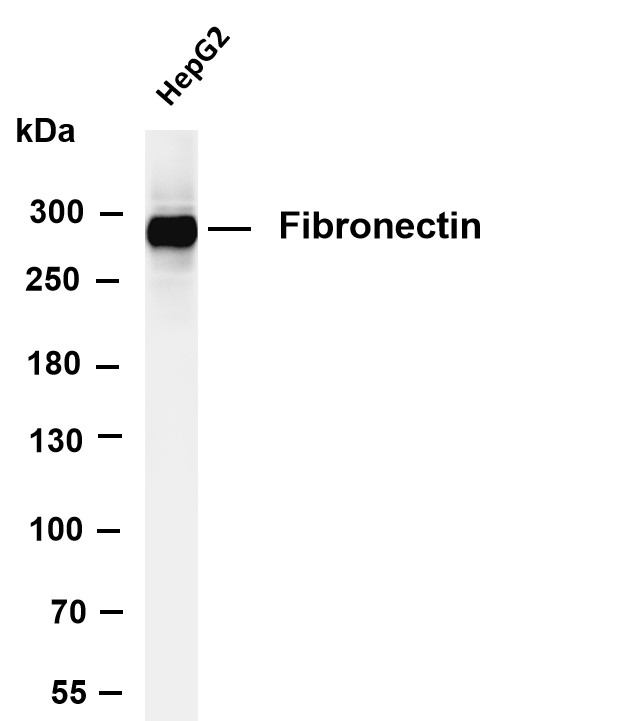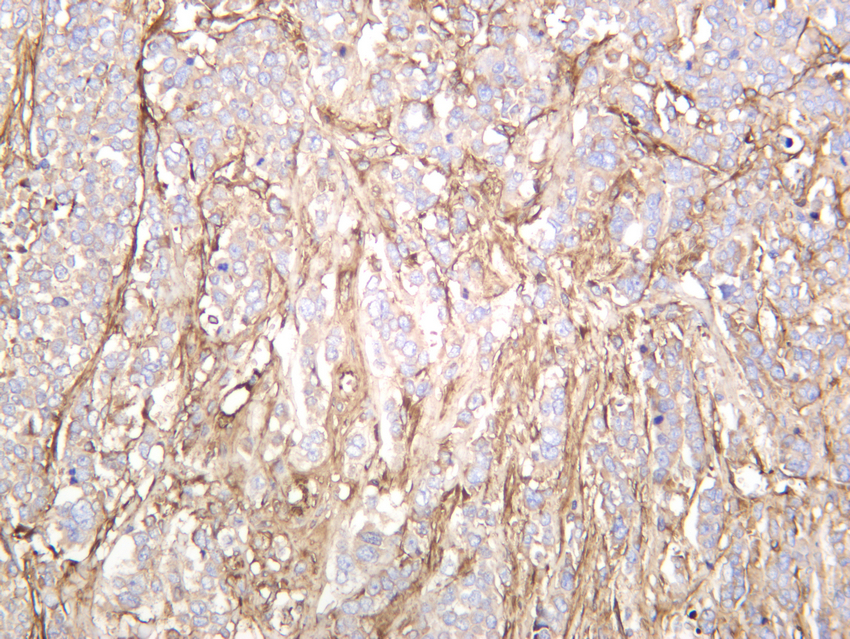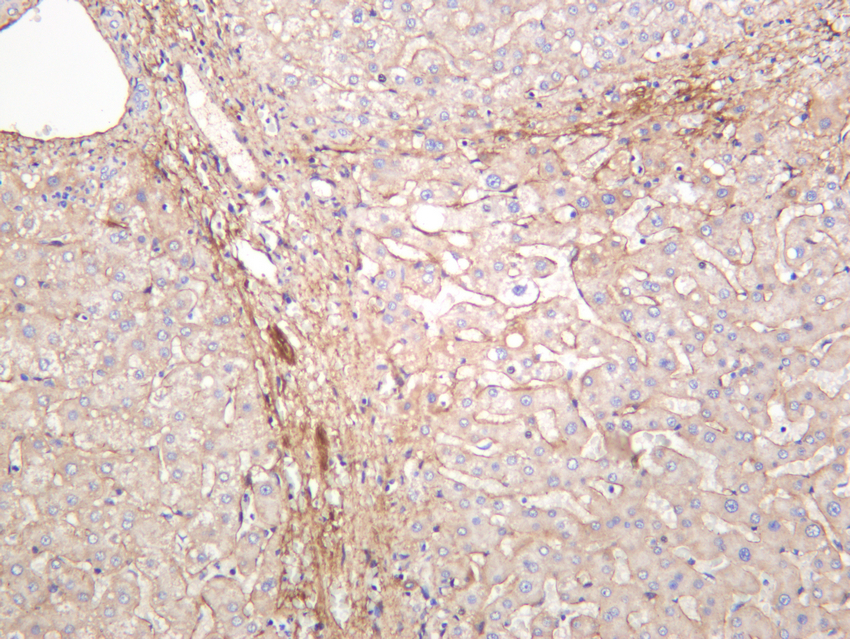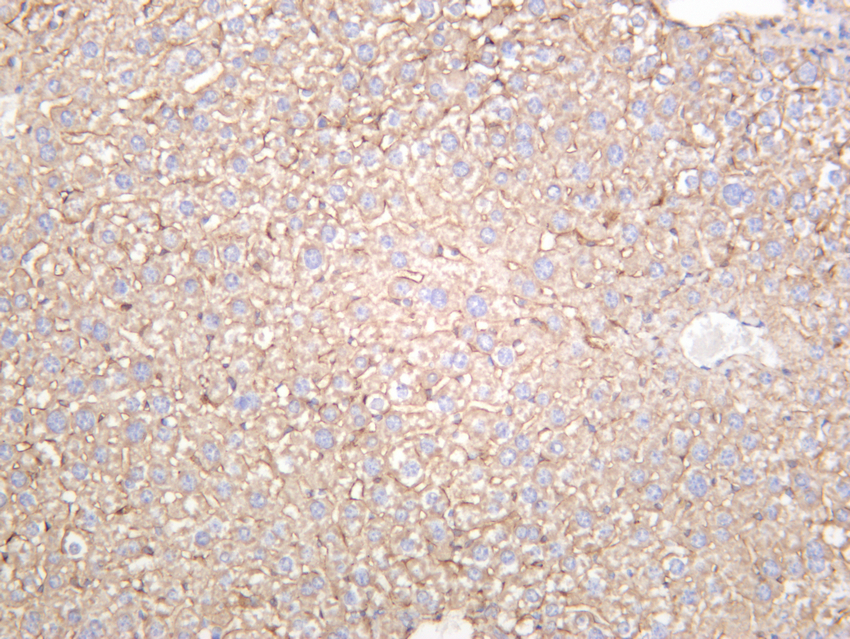Fibronectin (PT0476R) PT® Rabbit mAb
- Catalog No.:YM8309
- Applications:WB;IHC;IF;IP;ELISA
- Reactivity:Human; Mouse; Rat;
- Target:
- Fibronectin
- Fields:
- >>PI3K-Akt signaling pathway;>>Focal adhesion;>>ECM-receptor interaction;>>Regulation of actin cytoskeleton;>>AGE-RAGE signaling pathway in diabetic complications;>>Bacterial invasion of epithelial cells;>>Yersinia infection;>>Amoebiasis;>>Human papillomavirus infection;>>Pathways in cancer;>>Proteoglycans in cancer;>>Small cell lung cancer
- Gene Name:
- FN1
- Protein Name:
- Fibronectin
- Human Gene Id:
- 2335
- Human Swiss Prot No:
- P02751
- Mouse Gene Id:
- 14268
- Mouse Swiss Prot No:
- P11276
- Rat Swiss Prot No:
- P04937
- Specificity:
- endogenous
- Formulation:
- PBS, 50% glycerol, 0.05% Proclin 300, 0.05%BSA
- Source:
- Monoclonal, rabbit, IgG, Kappa
- Dilution:
- IHC 1:1000-1:5000;WB 1:2000-1:10000;IF 1:200-1:1000;ELISA 1:5000-1:20000;IP 1:50-1:200;
- Purification:
- Protein A
- Storage Stability:
- -15°C to -25°C/1 year(Do not lower than -25°C)
- Other Name:
- FN1;FN;Fibronectin;FN;Cold-insoluble globulin;CIG
- Molecular Weight(Da):
- 263kD
- Observed Band(KD):
- 285kD
- Background:
- This gene encodes fibronectin, a glycoprotein present in a soluble dimeric form in plasma, and in a dimeric or multimeric form at the cell surface and in extracellular matrix. The encoded preproprotein is proteolytically processed to generate the mature protein. Fibronectin is involved in cell adhesion and migration processes including embryogenesis, wound healing, blood coagulation, host defense, and metastasis. The gene has three regions subject to alternative splicing, with the potential to produce 20 different transcript variants, at least one of which encodes an isoform that undergoes proteolytic processing. The full-length nature of some variants has not been determined. [provided by RefSeq, Jan 2016],
- Function:
- alternative products:Additional isoforms seem to exist,developmental stage:Ugl-Y1, Ugl-Y2 and Ugl-Y3 are present in the urine from 0 to 17 years of age.,disease:Defects in FN1 are the cause of glomerulopathy with fibronectin deposits type 2 (GFND2) [MIM:601894]; also known as familial glomerular nephritis with fibronectin deposits or fibronectin glomerulopathy. GFND is a genetically heterogeneous autosomal dominant disorder characterized clinically by proteinuria, microscopic hematuria, and hypertension that leads to end-stage renal failure in the second to fifth decade of life.,function:Fibronectins bind cell surfaces and various compounds including collagen, fibrin, heparin, DNA, and actin. Fibronectins are involved in cell adhesion, cell motility, opsonization, wound healing, and maintenance of cell shape. Interaction with TNR mediates inhibition of cell adhesion and neurite outgrowth
- Subcellular Location:
- Secreted
- Expression:
- Expressed in the inner limiting membrane and around blood vessels in the retina (at protein level) (PubMed:29777959). Plasma FN (soluble dimeric form) is secreted by hepatocytes. Cellular FN (dimeric or cross-linked multimeric forms), made by fibroblasts, epithelial and other cell types, is deposited as fibrils in the extracellular matrix. Ugl-Y1, Ugl-Y2 and Ugl-Y3 are found in urine (PubMed:17614963).
TWIK-related acid-sensitive K+ channel 2 promotes renal fibrosis by inducing cell-cycle arrest
MicroRNA-10 Family Promotes the Epithelial-to-Mesenchymal Transition in Renal Fibrosis by the PTEN/Akt Pathway CURRENT ISSUES IN MOLECULAR BIOLOGY Chaokun Wang, Yichen Shuai, Chuan Zhao, Fengrui Yang, Weilian Su, Zhifen Ning, Guoxia Li WB Human HK-2 cell
Glycated albumin triggers fibrosis and apoptosis via an NADPH oxidase/Nox4-MAPK pathway-dependent mechanism in renal proximal tubular cells. MOLECULAR AND CELLULAR ENDOCRINOLOGY Mol Cell Endocrinol. 2015 Apr;405:74 WB Rat 1:1000 NRK-52E cell
The mechanism of mulberry leaves against renal tubular interstitial fibrosis through ERK1/2 signaling pathway was predicted by network pharmacology and validated in human tubular epithelial cells. PHYTOTHERAPY RESEARCH 2019 Jun 17 WB Human 1:600 HK-2 cell
Astragaloside IV inhibits palmitate-mediated oxidative stress and fibrosis in human glomerular mesangial cells via downregulation of CD36 expression. Pharmacological Reports Pharmacol Rep. 2019 Mar;71(2):319-329 WB Rat 1:2000 kidney
Salvianolic Acid B-Alleviated Angiotensin II Induces Cardiac Fibrosis by Suppressing NF-κB Pathway In Vitro. MEDICAL SCIENCE MONITOR Med Sci Monitor. 2018; 24: 7654–7664 WB Rat 1: 1000 cardiac fibroblasts (CFBs)
Zhang, Hong, et al. "Therapeutic potential of bixin in PM2. 5 particles-induced lung injury in an Nrf2-dependent manner." Free Radical Biology and Medicine 126 (2018): 166-176.
Astragaloside IV inhibits palmitate-mediated oxidative stress and fibrosis in human glomerular mesangial cells via downregulation of CD36 expression. Pharmacological Reports Pharmacol Rep. 2019 Mar;71(2):319-329 WB Rat 1:2000 kidney
- June 19-2018
- WESTERN IMMUNOBLOTTING PROTOCOL
- June 19-2018
- IMMUNOHISTOCHEMISTRY-PARAFFIN PROTOCOL
- June 19-2018
- IMMUNOFLUORESCENCE PROTOCOL
- September 08-2020
- FLOW-CYTOMEYRT-PROTOCOL
- May 20-2022
- Cell-Based ELISA│解您多样本WB检测之困扰
- July 13-2018
- CELL-BASED-ELISA-PROTOCOL-FOR-ACETYL-PROTEIN
- July 13-2018
- CELL-BASED-ELISA-PROTOCOL-FOR-PHOSPHO-PROTEIN
- July 13-2018
- Antibody-FAQs
- Products Images

- Various whole cell lysates were separated by 4-8% SDS-PAGE, and the membrane was blotted with anti-Fibronectin (PT0476R) antibody. The HRP-conjugated Goat anti-Rabbit IgG(H + L) antibody was used to detect the antibody. Lane 1: HepG2 Predicted band size: 263kDa Observed band size: 285kDa

- Human breast was stained with anti-Fibronectin (PT0476R) rabbit antibody

- Human liver was stained with anti-Fibronectin (PT0476R) rabbit antibody

- Mouse liver was stained with anti-Fibronectin (PT0476R) rabbit antibody



